![]()
Bi-fold doors can make a dramatic difference to a home, letting light flood in and giving the illusion of much more space. Once installed, however, it’s important that the effect isn’t compromised by the styling of the room.
We asked a range of leading interior designers and architects for their expert advice on do’s and don’ts when styling around bi-fold doors.
Meet the experts:
 | Gilly Craft—Koubou Interiors Gilly is President of The British Institute of Interior Design (BIID) and the founder of Koubou Interiors. She is a well-known name in the interior design world, and is often found judging and presenting prestigious interior design awards and guest speaking at high-profile events. |
 | Hannah Walton—House on the Hill Design Hannah specialises in salvaging and reclaiming furniture, incorporating her bespoke pieces into her interior designs to stunning effect. |
 | Steve Reading—Collier Reading Architects Steve is the managing director of award-winning architectural and design practice Collier Reading Architects, delivering unique solutions in design, planning and construction. |
 | Elaine Penhaul—Lemon and Lime Interiors Elaine is the director of Lemon and Lime Interiors, a unique home design consultancy specialising in developing country properties. |
 | Steph Briggs—La Di Da Interiors Steph is the creative director and owner of La Di Da Interiors. Alongside running her award-winning homewares shop, Steph also offers one-to-one advice on interior design. |
 | Ramsey Dawson—Ramsey’s Ramsey is the founder of Ramsey’s, offering a complete design and planning service for bespoke kitchens, bathrooms and bedrooms. |
 | Rebecca Dupère—Dupère Interior Design Rebecca owns and runs Dupère Interior Design, heading up a multi-skilled team to provide bespoke interior design commissions. |
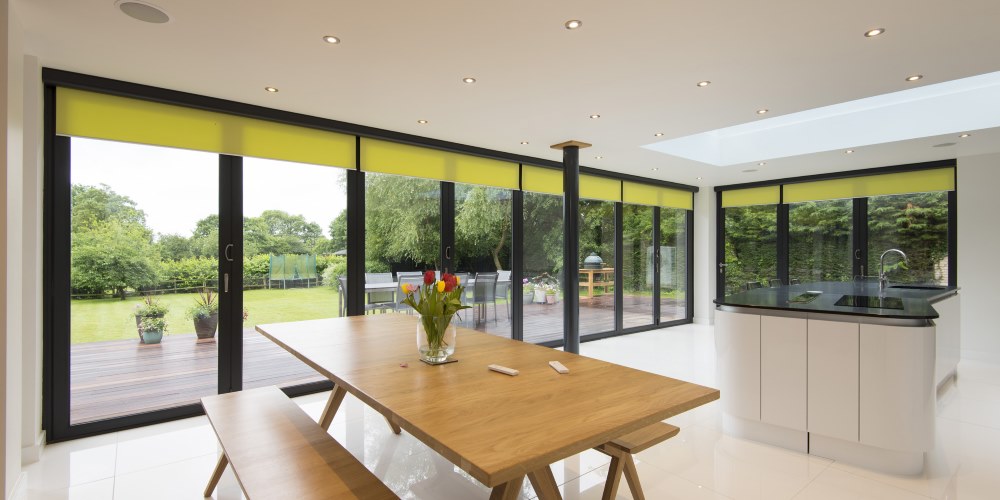
Curtains and blinds
Gilly: Some bi-fold doors fold inwards or half inwards. These doors can be difficult to dress with curtains as they can snag when the doors are opened, and the leading edge can get dirty with traffic into the garden. It’s also possible for curtains to get ‘sucked out’ through the door, again causing them to get dirty. For these reasons I wouldn’t personally recommend curtains, but a sheer could work or sliding or shoji blinds. | Steve: Integral blinds within the glazing are a good option as the clean lines created by a glazed wall are not compromised by curtains. | ||
Steph: Don’t ‘make do’—hire a professional to design and install your window coverings. Look for someone who has worked on bi-folds before and suits your style. | |||
Hannah: When dressing your bi-fold doors my advice would be to keep it minimal—avoid curtains or anything too fussy. There are a variety of blinds or shutters designed to fit individual panels on bi-fold doors, which is a discreet and effective way to keep out heat and light on a sunny day without taking away the beauty of the doors. | |||
Rebecca: When planning for your bi-fold doors remember to leave enough space for curtains to stack back either side so as not to impede the view. If you’re thinking of having blinds, consider whether your bi-fold doors fold outwards or inwards. | Elaine: Bi-fold doors are made and designed to look like a statement piece and are all about the look. Many people choose to leave them curtain-free, making the most of the light beaming in to the room. If, however, you would prefer curtains for warmth and privacy, think carefully about where they are placed so that you can still fold back the doors. | Ramsey: Automatic roll-up blinds systems can now be controlled via an app, and can also be programmed to lower at different times of the day. Make sure you leave the right amount of space in the window reveal to accommodate the blind systems. Don’t forget to get power to these locations if you want them to be automatic. | |
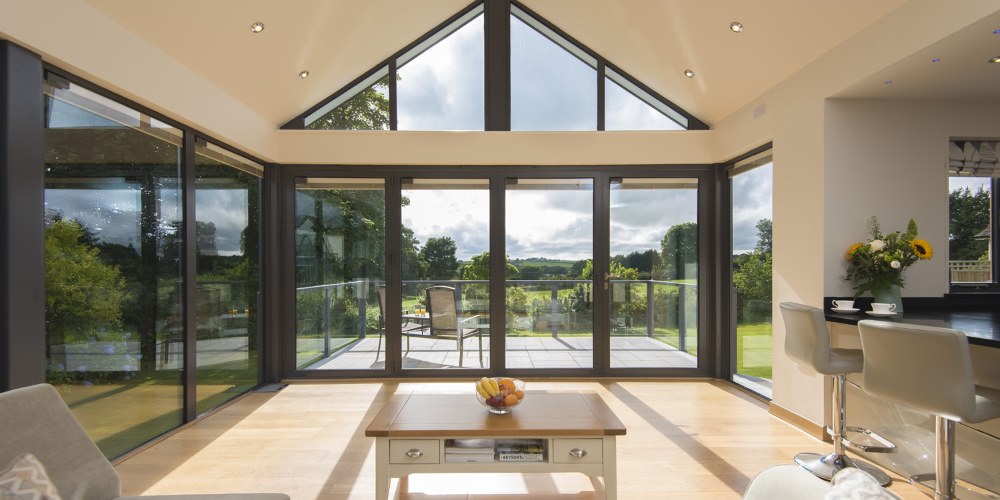
Furniture
Elaine: Avoid heavy dark furniture which detracts from what you’re trying to achieve by putting in bi-fold doors in the first place. If you’ve put in the bi-folds to make the best of the view over the garden, don’t block the view with big furniture. Equally, if you’re going to open the doors on a regular basis, make life easy and don’t have furniture in the way. | Steph: Be aware that additional light can affect your furnishings—leather will fade in direct sun. Also, pale colours can get lost if sat next to a riot of colour in a summer garden. If in doubt, go for neutral textures which will complement your outside space. | |
Steve: Lightweight, pale-coloured furniture is normally helpful near glazed walls to continue the open feel created, although this very much depends on the room and views. | Gilly: Keep furniture minimal and of a neutral colour. Don’t place upholstered furniture too near to the doors if fading from sunlight could be an issue. | |
Hannah: I love to see bi-folds with a big comfy armchair. Make the most of the wall of glass you’ve had installed and take in the view of your outside space. | Ramsey: If you have a kitchen island in your design, make sure you have enough clearance around the furniture and the open bi-fold doors to comfortably work at the island. | |
Rebecca: When bi-fold doors are opening into the room, think carefully about where you place the furniture as you don’t want to be moving it to draw curtains, operate blinds or open the doors. | ||
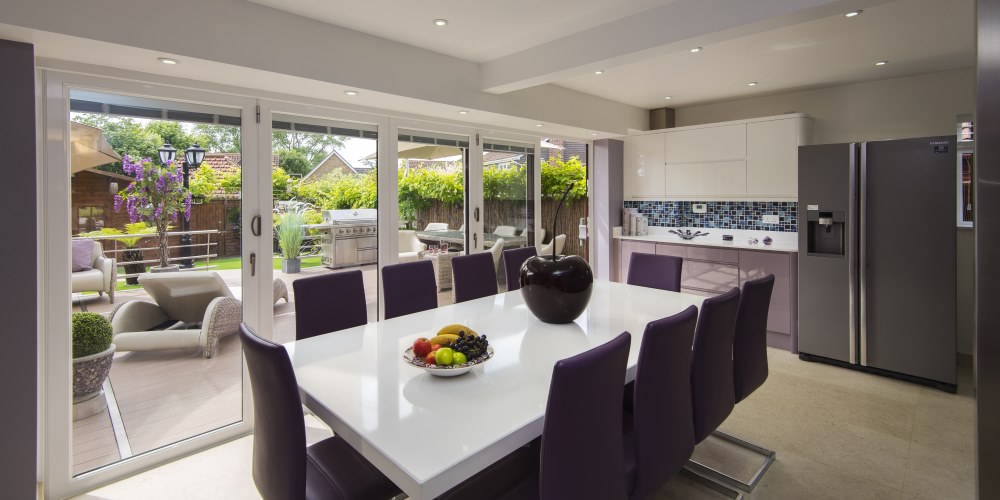
Room décor
Gilly: Bi-fold doors make the outside space the feature, so detracting from this isn’t the way to go. The scheme should take into consideration both areas, outside and in—if the inside is over-busy, then this detracts. A minimal design with neutral shades is best. | Steph: With the additional light bi-folds provide, you can be a little bolder than usual with colour. Consider using stronger colours and look at what’s outside—do you want to blend in with the view or contrast and complement? | |
Elaine: Keep the wall colours light to make the room feel big and use artwork and soft furnishings as a way of adding bursts of colour into the room. Mirrors placed on the wall opposite the bi-fold doors are a wonderful way of reflecting light. | Hannah: When it comes to décor I would keep the colour neutral and keep any patterns to a minimum. I would avoid wallpaper and instead opt for a nice, warm neutral-coloured paint that complements your chosen frame colour for your doors. | |
Rebecca: To make the most of a view it’s best to choose fabrics or patterns that frame it rather than compete. | Ramsey: If it’s a small room, avoid dark colours—they will only make the room feel smaller. The lighter colours will reflect the sunlight and make the room feel bigger. | |
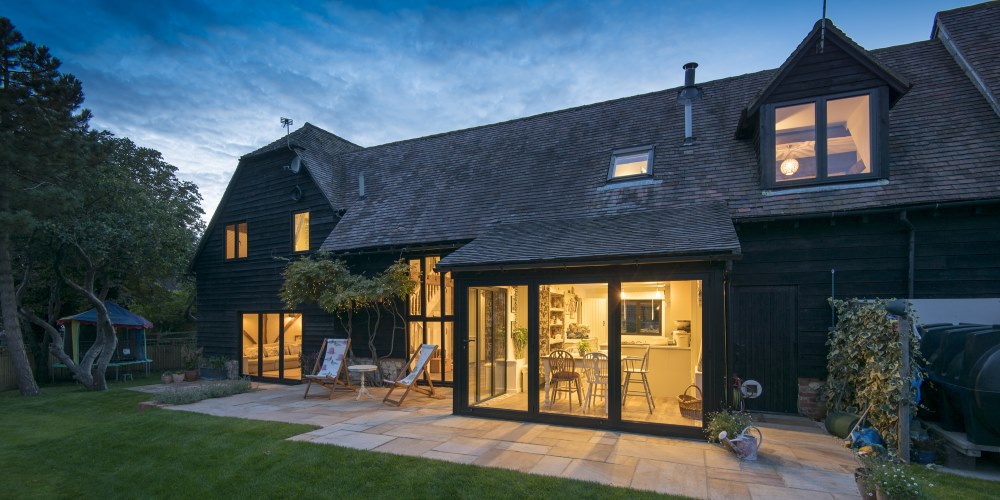
Lighting
Hannah: Having bi-fold doors fitted is going to create a huge amount of light and a sense of space. Therefore, lighting is very much down to personal taste rather than a necessity. I favour spotlights because they are minimal and do the job. However, it’s important to always add a lamp—whether a table lamp or floor lamp—after dark they help to add a sense of ambience and warmth to a room. | Rebecca: You will hopefully have gained a lot of natural light but will still need good task lighting for the evenings. | Gilly: Bad lighting can ruin any scheme. Lighting is often forgotten but it shouldn’t be. Depending on what you’re using the space for, a layered scheme is best, incorporating task and decorative lighting. Have a lighting scheme in the outside space as well—lighting various features in the garden looks very good at night. |
Steph: Lamps and candles work well for soft lighting to complement the natural light the bi-folds provide. | ||
Steve: Reflection in glazed walls is a consideration and can be used to enhance the feeling of depth. Similarly, external lighting can be utilised to avoid the “black wall” effect at night. | Elaine: Keep lighting as simple as possible—i.e. stick to plain ceiling lights—as it’s all about the bi-folds and the view. | |
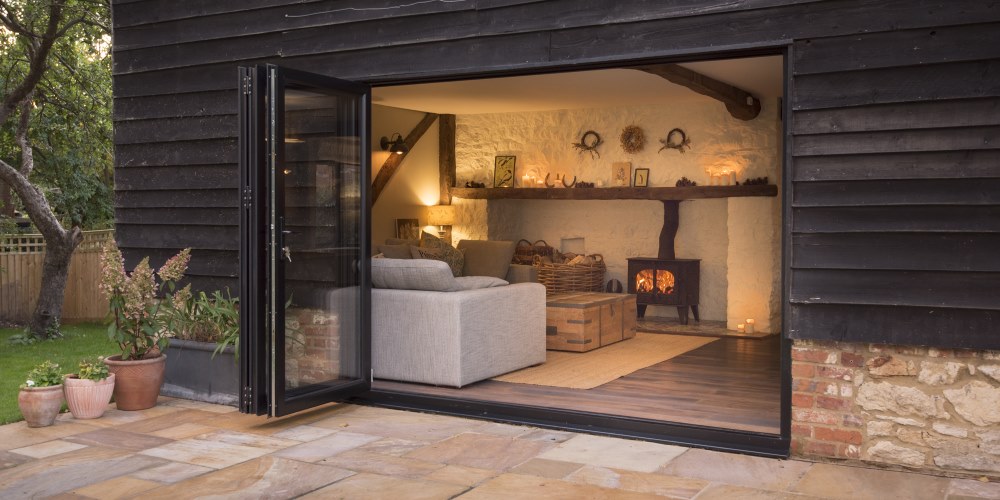
Accessories
Steph: Reflect the outside on the inside—a vase of flowers or a large houseplant will provide continuity. If you have garden furniture, consider painting it in a colour that matches something inside—make the garden and room one scheme. | Ramsey: Think about extending the kitchen flooring so it continues outside—when the bi fold doors are open, the outside feels like a natural extension the house. Make sure you fit a good-quality porcelain tile which is frost-proof. | |
Elaine: Accessories can transform a room and help add personality. Don’t overdo it—too many accessories make a room feel cluttered. | Gilly: Accessorise a neutral scheme by introducing colour, in the way of feature walls, art or accessories. | |
![]()
Room shape
Steve: You need to consider each project on its individual merits as to whether or not bi-fold doors are appropriate for the space. Full height glazing is not always practical if it’s necessary to place furniture in front of it. | Elaine: Many people feel you must have a perfectly square room for bi-folds to look great, but this isn’t always the case. Work with the space you have available and make the most of it. Bi-folds work well in any room so will still have the same great affect. The width of the panes and the number of panels are flexible and also the position of where you would prefer the door to stack back depending on the layout of the room. | |
Ramsey: Make sure the doors have enough space to open without fouling on furniture. Plan your room layout in advance to avoid any surprises once the doors are fitted. | Gilly: Big open-plan spaces work best with bi-fold doors. | |
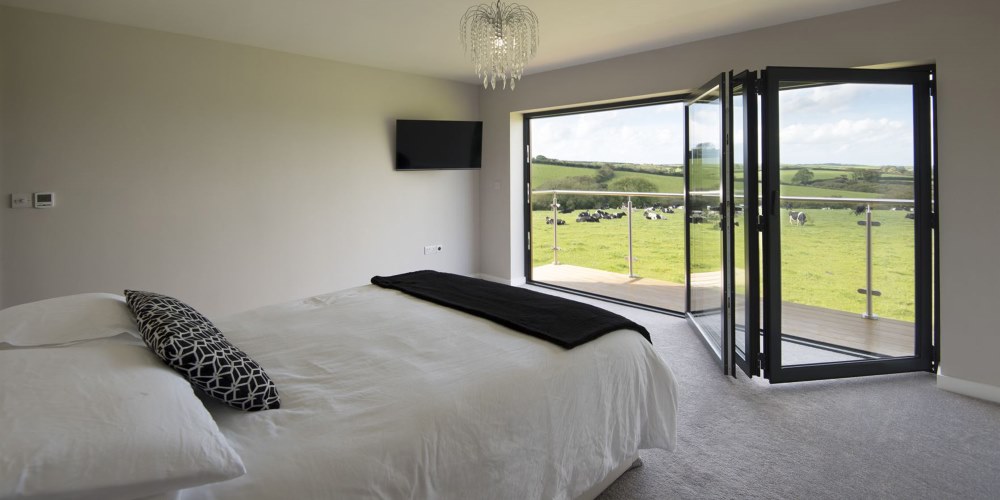
Practicalities
Steve: Bi-fold doors create a modern and clean architectural solution both internally and externally and allow the creation of totally clear openings to the outside in the summer months. It’s imperative that structural openings are properly considered and incorporate properly designed lintels over as any movement or settlement will result in binding. | Steph: Do consider the use of the room, layout of furniture and where you spend most of your time. If it’s a kitchen, which direction do you face most of the time? If it’s a sitting room, play around with different layouts of furniture. What works best in summer may not be best for the winter months. | |
Steve: It’s crucial to properly consider how the bi-fold configuration will work in your room. Think about the direction of opening, if leaves open in or out, whether or not one panel can be utilised as an opening door for day-to-day use when the rest are closed, the position of that door so as not to sterilise the room, etc. Any glazed opening should consider how it affects or accentuates the views created and if possible maximise any visual link with outside space. | ||
Gilly: There are a lot of different finishes for bi-fold doors, from wood to powdered aluminium. The finish of the doors should be taken into consideration as part of the scheme. | ||
Elaine: Style is very personal but needs to be based on the use of the room, i.e. whether it’s been designed as a sitting area or a dining space. | ||




































